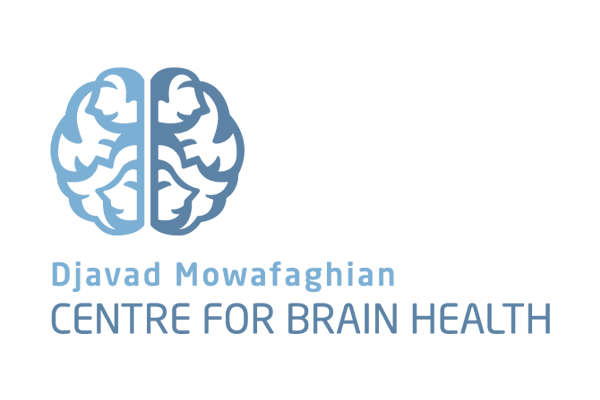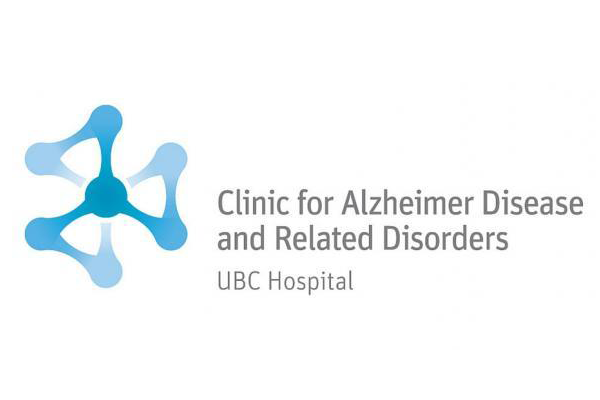The research activities of our integrated interdisciplinary team are focused and driven by the needs of patients and families attending UBCH CARD.
The Alzheimer disease research programs at the Djavad Mowafaghian Centre for Brain Health are led by a team of distinguished investigators with expertise spanning the continuum from discovery research to translational and clinical research. These individuals—many of whom have achieved the highest honours of their profession—are internationally renowned for their field-changing contributions, including discoveries on the genetics and inheritance of the dementias, elucidation of the causes and potential novel treatment targets for Alzheimer disease, and contributing to the reshaping of the field toward earlier intervention and disease prevention.
The program is deeply committed to ensuring that research progress is translated seamlessly to clinical care through its engagement in the development of clinical practice guidelines, public policy, and through leadership on national/global research initiatives.
The clinic strives to be at the vanguard of Alzheimer disease care, engaging in research to investigate the disease from all angles, including the root causes and underlying mechanisms for effective prevention, early detection, advanced treatment, and interventions to improve quality of life.
RESEARCH STUDIES AT UBCH CARD
CURRENTLY ENROLLING (2023)
ADNI-3
This study is a continuation of the ADNI-2 study and will open to enrolment of new participants. The purpose of this study is to collect brain scans, blood samples, memory test scores, and cerebrospinal fluid from people with AD, MCI, or no memory impairment. These data may help characterize the early stages of AD, and shape the criteria for earlier diagnosis and treatment of AD. They may also influence future clinical trials that focus on identifying and treating early AD.
ONGOING, BUT NO LONGER ENROLLING
COMPASS-ND STUDY
This observational study, conducted by the Canadian Consortium on Neurodegeneration and Aging (CCNA), will evaluate the usefulness of imaging studies, clinical assessments, and biomarker tests, together with measurements of memory, thinking, and daily functioning, for assessing different sorts of cognitive and movement changes seen in older adults.
EMBARK STUDY
The purpose of the study is to evaluate the long-term safety and tolerability of aducanumab after a wash-out period in participants who had previously received aducanumab or who had previously received placebo.
CRE-AD STUDY
The primary objective of this study is to evaluate the effectiveness of monthly doses of creneuzumab in slowing memory loss in people diagnosed with MCI or AD. The protein amyloid beta is found in higher amount s in the brains of people with AD. Creneuzumab is a recombinant human monoclonal antibody that binds to amyloid in the brain and therefore may remove existing plaques.
ADNI-2
The purpose of this study is to collect brain scans, blood samples, memory test scores, and cerebrospinal fluid from people with AD, MCI, or no memory impairment. These data may help characterize the early stages of AD, and shape the criteria for earlier diagnosis and treatment of AD. They may also influence future clinical trials that focus on identifying and treating early AD.
CURRENTLY ENROLLING (2023)
CASSAVA Study
The purpose of this clinical research study is to learn more about the use of the study drug, simufilam, for the treatment of Alzheimer's disease. Simufilam is an oral drug meant to restore the normal shape and function of a brain protein called filamin A (FLNA).
Contact: Michele Assaly, Research Coordinator, Phone 604-822-1782. Email: Michele.Assaly@vch.ca
ADNI-3
This study is a continuation of the ADNI-2 study and will open to enrolment of new participants. The purpose of this study is to collect brain scans, blood samples, memory test scores, and cerebrospinal fluid from people with AD, MCI, or no memory impairment. These data may help characterize the early stages of AD, and shape the criteria for earlier diagnosis and treatment of AD. They may also influence future clinical trials that focus on identifying and treating early AD.
ACAD STUDY
The primary objective is to collect saliva/ blood sample, memory test scores, data on demographics, lifestyle, early life experiences, and medical history from people of Chinese descent. With the collected data, the ACAD study team aims to investigate the impact of genetic and non-genetic risk factors for AD, evaluate the differential effects of sex and APOE genotypes on AD risk, and predict diagnosis of AD using dementia risk scores derived from genetic and non-genetic risk factors.
SARTAN-AD STUDY
The study investigators are examining whether certain types of blood pressure medications may have an added benefit of slowing the progression of AD. The two blood pressure medications being compared in this study are called telmisartan and perindopril. Both medications are commonly used and currently approved by Health Canada for treating high blood pressure.
CAMERA STUDY
Regular monitoring of body movement, mood, and disease symptoms in people with Parkinson’s disease or Alzheimer’s disease is of importance to assess disease progression and inform treatment decisions. However, assessments of these symptoms are typically only performed once a year. Nowadays there are numerous patient-worn sensors available that can measure movement and symptom severity. This places a burden on the patients as they will have to wear the sensors for long periods of time. We believe that the use of smart cameras can overcome this problem. We aim to develop a monitoring tool that can measure body movement, mood, and disease symptoms from video recordings. Ultimately, these cameras immediately anonymize the patient identification, by converting the images into stick figures, to preserve privacy and no data is being stored or transmitted. Our current study aims to develop the algorithms that will extract the valuable clinical information from the video recordings. For more information, please contact Ravneet Mahal at ravneet.mahal@ubc.ca or call 604-822-7763
ONGOING, BUT NO LONGER ENROLLING
COMPASS-ND STUDY
This observational study, conducted by the Canadian Consortium on Neurodegeneration and Aging (CCNA), will evaluate the usefulness of imaging studies, clinical assessments, and biomarker tests, together with measurements of memory, thinking, and daily functioning, for assessing different sorts of cognitive and movement changes seen in older adults.
DIAN-TU STUDY
The study evaluates whether 2 amyloid lowering agents, solenezumab, or gantenerumab, both antibodies which bind to amyloid beta, can prevent or delay the onset of memory loss in subjects who are at risk of developing memory problems due to an autosomal dominant genetically inherited form of AD. Participants do not have to know about their genetic status, but there must be a proven mutation in the family.
EMBARK STUDY
The purpose of the study is to evaluate the long-term safety and tolerability of aducanumab after a wash-out period in participants who had previously received aducanumab or who had previously received placebo.
CRE-AD STUDY
The primary objective of this study is to evaluate the effectiveness of monthly doses of creneuzumab in slowing memory loss in people diagnosed with MCI or AD. The protein amyloid beta is found in higher amount s in the brains of people with AD. Creneuzumab is a recombinant human monoclonal antibody that binds to amyloid in the brain and therefore may remove existing plaques.
MITNEC STUDY
The aim of this study is to look at usefulness of imaging studies, genetic tests and measurements of memory and thinking in AD and white matter disease. By using these advanced techniques we can compare changes in the brain over 2 years.
ADNI-2
The purpose of this study is to collect brain scans, blood samples, memory test scores, and cerebrospinal fluid from people with AD, MCI, or no memory impairment. These data may help characterize the early stages of AD, and shape the criteria for earlier diagnosis and treatment of AD. They may also influence future clinical trials that focus on identifying and treating early AD.
CURRENTLY ENROLLING (2023)
ALLFTD STUDY
ALLFTD is a multisite research project aimed at understanding the changes in brain function that occur as a result of frontotemporal lobar degeneration (FTLD) syndromes. FTLD syndromes can include bvFTD, bvFTD with ALS, PPA, PSP, or CBD. Some forms of FTLD are genetic, while others are not. ALLFTD is interested in all forms of FTLD. This study is interested in learning about the changes in the body fluids and brain that we think change in response to disease progression.
ONGOING, BUT NO LONGER ENROLLING
COMPASS-ND STUDY
This observational study, conducted by the Canadian Consortium on Neurodegeneration and Aging (CCNA), will evaluate the usefulness of imaging studies, clinical assessments, and biomarker tests, together with measurements of memory, thinking, and daily functioning, for assessing different sorts of cognitive and movement changes seen in older adults.
OXYTOCIN FTD STUDY
The clinical trial will investigate whether oxytocin has any effect on controlling some of the behavioural symptoms in FTD. We will also monitor for any side-effects that one might experience during the treatment period. The duration of this study is 24 weeks.
FTD STUDY
The purpose of this study is to identify the biochemical and genetic basis of frontotemporal dementia (FTD), and to better understand the clinical and cognitive features of the disease. These data may improve our diagnostic techniques and lead to new treatments for FTD. To date our research group has identified two novel gene mutations that cause FTD (Progranulin and C9ORF72).
CURRENTLY ENROLLING (2023)
ONGOING, BUT NO LONGER ENROLLING
COMPASS-ND STUDY
This observational study, conducted by the Canadian Consortium on Neurodegeneration and Aging (CCNA), will evaluate the usefulness of imaging studies, clinical assessments, and biomarker tests, together with measurements of memory, thinking, and daily functioning, for assessing different sorts of cognitive and movement changes seen in older adults.
CURRENTLY ENROLLING (2023)
ONGOING, BUT NO LONGER ENROLLING
MITNEC STUDY
The aim of this study is to look at usefulness of imaging studies, genetic tests and measurements of memory and thinking in AD and white matter disease. By using these advanced techniques we can compare changes in the brain over 2 years.
COMPASS-ND STUDY
This observational study, conducted by the Canadian Consortium on Neurodegeneration and Aging (CCNA), will evaluate the usefulness of imaging studies, clinical assessments, and biomarker tests, together with measurements of memory, thinking, and daily functioning, for assessing different sorts of cognitive and movement changes seen in older adults.
CURRENTLY ENROLLING (2023)
ACAD STUDY
The primary objective is to collect saliva/ blood sample, memory test scores, data on demographics, lifestyle, early life experiences, and medical history from people of Chinese descent. With the collected data, the ACAD study team aims to investigate the impact of genetic and non-genetic risk factors for AD, evaluate the differential effects of sex and APOE genotypes on AD risk, and predict diagnosis of AD using dementia risk scores derived from genetic and non-genetic risk factors.
ONGOING, BUT NO LONGER ENROLLING
A4 STUDY
The purpose of this study is to evaluate whether the use of solanezumab, a monoclonal antibody which binds to amyloid beta, can slow memory loss in participants who may be at risk of developing Alzheimer disease (AD). Amyloid beta is a component of amyloid plaques which are found in patients with AD. It is thought that AD-related damage to the brain begins many years before the symptoms of memory loss emerge, and is hoped that starting treatment very early will help slow the progression of memory loss.
CURRENTLY ENROLLING (2023)
THE CARD STUDY
The goal of this study is to gather as much information as possible on all patients referred for a clinical assessment. Blood samples collected for DNA extraction, serum and plasma banking may identify biomarkers and risk-factor genes associated with a particular type of dementia. These discoveries may lead to an improved diagnosis and treatment of dementia.
REGISTRY STUDY
The purpose of this study is to create a registry of people who are interested in participating in currently enrolling or future studies. This study also aims to determine whether you may be a possible candidate for one of the research studies currently enrolling at the University of British Columbia Hospital (UBCH) Clinic for Alzheimer and Related Disorders and Vancouver General Hospital (VGH) Stroke Clinic.



